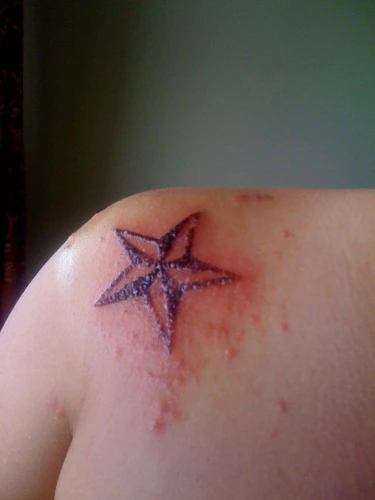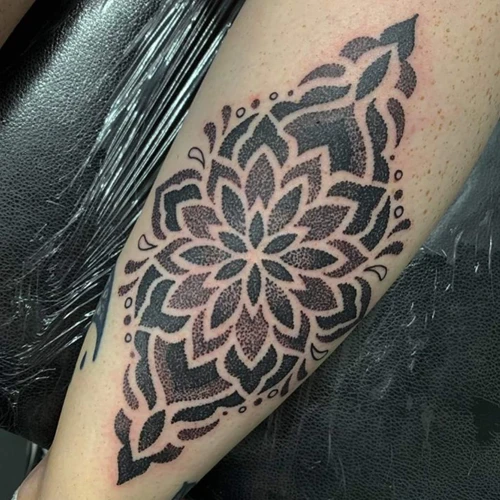Are you wondering why you can’t use Neosporin on tattoos? Neosporin is an antibiotic ointment that many people use to treat minor cuts and scrapes. However, when it comes to tattoos, many people wonder if Neosporin is an appropriate choice. In this article, we will explore why you can’t use Neosporin on tattoos and the alternative treatments that are available. We will also answer the most commonly asked questions about why you can’t use Neosporin on tattoos.
Contents
What is Neosporin?

Neosporin is a brand name for a triple antibiotic ointment containing three active ingredients: bacitracin, neomycin, and polymyxin B. It is used to treat minor cuts, scrapes, and burns. It is often used to prevent infection and speed healing. The active ingredients in Neosporin are all antibiotics, which are effective against a wide range of bacteria.
Why is Neosporin Bad for Tattoos?
Neosporin is not recommended for use on tattoos because it can cause a reaction that can damage the skin and interfere with the healing process. Neomycin, one of the antibiotics in Neosporin, is known to cause allergic reactions in some people. This can result in itching, swelling, redness, and blistering of the skin. Additionally, the petrolatum base of Neosporin can interfere with the body’s ability to absorb the ink, leading to blurry or faded tattoos.
How Neosporin Affects the Skin

Neosporin is a topical antibiotic made of three antibiotics: bacitracin, neomycin, and polymyxin B, which is used to help treat minor cuts, scrapes, and burns, as well as prevent infection in minor wounds. While it is beneficial in healing minor wounds, Neosporin should not be used on tattoos. When Neosporin is applied to a tattoo, it can cause an allergic reaction or even a disfiguring infection, especially if the tattoo is still in the healing process.
Neosporin works to reduce inflammation and can help to keep the wound moist which can speed up the healing process. But when Neosporin is applied to a tattoo, it can clog the pores and cause a buildup of bacteria and toxins. This can cause the tattoo to become inflamed and infected, leading to pain and swelling. Neosporin also contains petroleum, which can damage the tattoo ink, causing it to fade over time and ruin the tattoo.
Using Neosporin on a tattoo can also reduce the body’s ability to heal itself. What happens if you put Neosporin on a tattoo is that it can actually stop the body’s natural healing process and create a barrier between the tattoo and the natural healing oils produced by the skin. This can lead to an infection and cause the tattoo to heal poorly.
Potential Risks of Using Neosporin on Tattoos

Allergic Reactions
The primary concern of using Neosporin on tattoos is the risk of an allergic reaction. Neosporin contains petroleum, which can cause an adverse reaction in some individuals and result in rash, itching, and other signs of an allergic reaction. If you experience any of these symptoms, stop using the product and consult a doctor immediately.
Infection
Neosporin is an over-the-counter product that is used to treat minor infections. While it can help with minor cuts and scrapes, it is not recommended for use on tattoos. Using Neosporin on tattoos can increase the risk of infection as it can trap bacteria and viruses in the skin, leading to an infection.
Scarring
Applying Neosporin to a tattoo can also increase the risk of scarring. Since the product is designed to create a barrier on the skin, it can cause the area to become dry and irritated. This can lead to scarring, which will be permanent and can significantly affect the appearance of the tattoo.
In conclusion, it is not recommended to use Neosporin on tattoos. The potential risks of allergic reactions, infection, and scarring far outweigh any benefits. If you have a minor cut or scrape on your tattoo, seek the advice of a medical professional before using any products.
Alternatives for Tattoo Aftercare
Cleaning
It is important to keep your new tattoo clean, as it is an open wound and needs to be treated with care. Make sure to use warm water and a mild, fragrance-free soap to clean the area two to three times a day. Pat the area dry with a clean, soft towel and then apply a thin layer of a fragrance-free ointment or lotion.
Applying a Thin Layer of an Ointment or Lotion
Using an ointment or lotion after cleaning will help keep the area moisturised, reducing itching and promoting healing. Petroleum jelly and A&D ointment are not recommended for tattoo aftercare, as they can trap bacteria. It is best to use a fragrance-free ointment or lotion specifically designed for tattoos. Neosporin should not be used on tattoos, as it can cause allergic reactions, rashes, and increased healing time.
Keeping Moisturised
Keeping the tattoo moisturised is essential for the healing process. Applying a thin layer of an ointment or lotion twice a day will help keep the area hydrated. It is important to avoid using too much oil or lotion, as this can cause the area to become too moist and cause an infection.
Sun Protection
It is important to keep your new tattoo out of direct sunlight for the first few weeks to avoid any damage to the area. After the initial healing period, use sunscreen to protect the area from sunburn and sun damage. If the area is exposed to the sun, make sure to apply a thin layer of sunscreen with an SPF of at least 30.
In conclusion, it is not recommended to use Neosporin on tattoos. Cleaning with warm water and a mild, fragrance-free soap, applying a thin layer of an ointment or lotion, keeping moisturised, and using sunscreen are all important steps to properly care for a new tattoo.
Frequently Asked Questions
What are the Risks of Using Neosporin on a Tattoo?
Using Neosporin on a new tattoo can increase the risk of skin irritation, infection, and discoloration. Neosporin is not specifically made for tattoos and can cause skin reactions that can interfere with the healing process. Using Neosporin can also clog the pores in the skin, trapping bacteria and oils and potentially leading to an infection. Additionally, Neosporin can interfere with the ink, causing it to become discolored or to fade over time. It is best to avoid using Neosporin on a new tattoo and to follow the aftercare instructions provided by the tattoo artist.
Is There an Alternative to Neosporin for Healing a Tattoo?
- Vaseline – Vaseline is an effective alternative to Neosporin in healing a tattoo. It helps to keep the area moist, preventing scabbing and infection. It also helps to form a barrier on the skin, preventing bacteria and dirt from penetrating the wound.
- Aquaphor – Aquaphor is another alternative to Neosporin that can be used to heal a tattoo. It forms a protective barrier on the skin, keeping dirt and bacteria out. It also helps to keep the area moist, preventing scabbing and infection.
- Antibacterial Soap – Antibacterial soap can be used to clean the area before and after a tattoo. It helps to remove dirt and bacteria, preventing infection. It can also be used in conjunction with other products to help keep the area clean and infection-free.
- Tea Tree Oil – Tea tree oil is an essential oil that can be used to help heal a tattoo. It has natural anti-microbial and anti-inflammatory properties, which can help to reduce swelling and reduce the risk of infection. It can also help to reduce itchiness and redness.
- Lavender Oil – Lavender oil is another essential oil that can be used to help heal a tattoo. It has anti-inflammatory properties and can help to reduce itching and redness. It can also help to reduce swelling and prevent infection.
- Honey – Honey is an effective alternative to Neosporin in healing a tattoo. It has natural antibacterial and anti-inflammatory properties, which can help to reduce swelling and prevent infection. It also helps to keep the area moist, preventing scabbing and infection.
Should I consult a doctor before using any ointment on my tattoo?
It is generally recommended that you consult a doctor before using any ointment on your tattoo, as certain ointments could potentially cause an allergic reaction or skin irritation. Additionally, certain ointments, such as Neosporin, may contain ingredients that can impede the healing process. Therefore, it is important to seek medical advice before applying ointment to your newly inked tattoo.
How Long Should I Wait Before Applying Any Ointment to a New Tattoo?
It is important to wait for the initial healing process to complete before applying any ointment on your new tattoo:
- Wait for at least two weeks before applying any ointment.
- Make sure the area is completely healed and looks normal.
- Keep the area clean and dry while it is healing.
- Do not apply ointment until it is completely healed.
- If you experience any itching or irritation, use a mild cleanser or ointment such as Aquaphor.
It is important to follow the aftercare instructions provided by your tattoo artist and to wait for the healing process to complete before applying any ointment. Applying ointment too soon can cause infection and can delay healing.
Does it Matter Which Type of Neosporin I Use On My Tattoo?
No, it does not matter. Neosporin is a brand of topical antibiotic and is not recommended for use on tattoos. Neosporin contains petroleum jelly, which can cause clogging of the skin pores, trapping bacteria and other irritants. This can lead to infection and can cause fading of the tattoo color.
It is best to avoid using any type of Neosporin on a tattoo.
- Neosporin can cause clogging of the skin pores, trapping bacteria and other irritants.
- This can lead to infection and can cause fading of the tattoo color.
- It is best to avoid using any type of Neosporin on a tattoo.
- The best product to use on a tattoo is a specialized tattoo aftercare product.
Tattoos need to be kept clean and moisturized for the best results. A specialized tattoo aftercare product is designed to provide the perfect balance of moisture and protection. These products contain ingredients that are specifically designed to help heal tattoos quickly and safely, without introducing any potential irritants.
Conclusion
Neosporin is not meant to be used on tattoos, as it contains petroleum-based ingredients that can worsen the healing process, cause skin irritation, and clog the pores of your tattoo. It’s best to stick to a product specifically designed for tattoos that contains natural ingredients. You should also always seek advice from your tattoo artist on the best way to care for your tattoo and make sure to clean the area daily with a mild, fragrance-free soap and moisturize with a fragrance-free lotion.